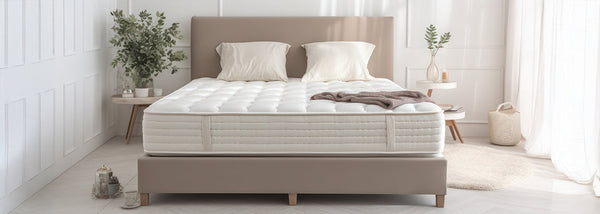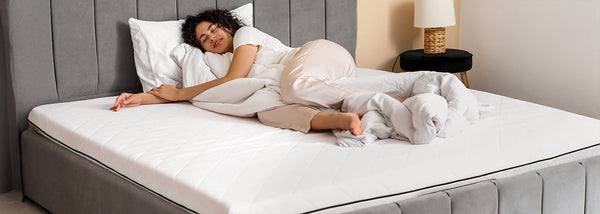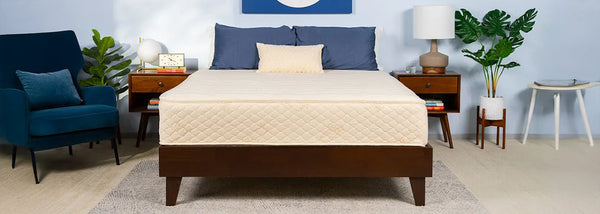Mattress Thickness : How Thick Should Your Mattress Be

Although many people consider the thickness of a mattress the pinnacle of luxury and good sleep, it's not a universal truth. The thickness you require will depend on various things, including how you sleep, your height, and if you share a bed.
A mattress's thickness is critical in providing the right support and comfort when one sleeps on it. However, a specific mattress thickness may not be suitable for some sleeping positions and body types. Read on to understand more about the thickness of mattresses.
The Role of Thickness in Comfort and Support of a Mattress
The thickness of the mattress is its height or depth, which can significantly affect your comfort while sleeping. The two basic layers in all mattresses are comfort and base layers. Sleeping on a mattress that’s too thin or too thick may lead to poor sleep and impact your health.
Slim mattresses generally contain layers of foam, giving them more comfort and durability. These mattresses are more suitable for adults with limited mobility who want to avoid thicker ones.
However, thicker mattresses have more layers, affecting your mattress's support, plushness, and durability. In some mattresses, these layers offer customised comfort to different regions of your body, like the head, shoulders, back, hips, and feet.
The best fit would be a mattress that provides firmer support on your head, back, and feet and softer cushioning on your shoulders and hips.
Materials Used in a Mattress
It’s a movement-absorbing, soft material that enables temperature regulation and pressure point relief. Common types of foam are gel memory foam, memory foam, and polyurethane foam.
It is used as a filling in mattress covers and pillowtop mattresses.
It is found in mattresses for temperature regulation and additional padding.
It is a breathable material used both outside and inside a mattress.
These are mainly used to bond materials, layers, and seams together for that perfect fit.
They come as either open or independently wrapped coils (pocketed coils). These are the main structural components that offer proper mattress base support.
What Mattress Thickness Do You Need?
One needs a good quality mattress to last for a long time and offer good support to the body. For that, proper mattress thickness is crucial. The support and comfort layers come in different densities and thicknesses depending on the requirement.
-
The Thickness of a Memory Foam Mattress:
A memory foam mattress provides a hugging/sinking experience for extreme comfort. Thus, the minimum thickness of a mattress that has pure memory foam should not be less than 6.5 to 7 inches. -
The Thickness of a Latex Foam Mattress:
Latex foam is rubber-like and offers a floating/hugging sleeping experience. In many cases, a 2-3 inch layer of latex foam is ideal and lasts long, providing the mattress with its shape and longevity for years. -
The Thickness of an Innerspring Mattress:
These mattresses are perfect for a supportive sleeping experience. The overall thickness of the innerspring mattress should be around 7 inches. -
The Thickness of a Foam Mattress:
Ideal for orthopedic use, the best thickness of any foam mattress should be within 6-7 inches. -
The Thickness of a Bonded Foam Mattress:
The rebounded or bonded foam is the go-to option for orthopedic mattresses and overweight individuals. The bonded foam mattress should be as thick as 3 inches to uphold the standard body weight. -
The Thickness of a Dual-Comfort Mattress
On average, dual-comfort mattresses should be 7 to 8 inches thick to maintain the structure of the mattress over time.
How thickness affects comfort and support
- Comfort:
- Surface Comfort: A thicker mattress typically provides a more cushioned and comfortable sleeping surface. This extra padding can help distribute your body weight more evenly, reducing pressure points and enhancing overall comfort.
- Plushness: Thicker mattresses often feel plusher, meaning they have a softer, more luxurious feel. This can be especially appealing to individuals who prefer a softer sleeping surface.
- Body Contouring: A thicker mattress may conform more closely to your body's natural curves, which can provide a cozy, "hugged" sensation while you sleep. Memory foam mattresses, in particular, are known for their ability to contour to your body shape.
- Deep Compression: If you enjoy sinking into your mattress and feeling enveloped by it, a thicker mattress can offer this sensation. It's a matter of personal preference, as some people prefer a firmer surface.
- Support:
- Core Support: While thickness impacts surface comfort, it's also essential to consider the mattress's core support system. Thicker mattresses often have more layers, including a supportive core, which is crucial for maintaining proper spinal alignment and preventing sagging.
- Firmness Options: Thicker mattresses can accommodate multiple layers of varying materials, allowing manufacturers to create different firmness options. This means you can find thick mattresses that range from plush to firm, catering to various sleep preferences.
- Weight Distribution: A thicker mattress with adequate support can better distribute your body weight, reducing the risk of sinking too deeply into the mattress, which can lead to discomfort and poor spinal alignment.
- Edge Support: Many thicker mattresses come with enhanced edge support, which makes it easier to sit or sleep near the edge without feeling like you might roll off. This can be especially useful for those who share a bed or need extra support when getting in and out of bed.
-
Personal Preferences:
Your personal preferences and needs are crucial when choosing mattress thickness:
- Body Type: Heavier individuals often benefit from thicker mattresses because they provide more support and durability. Lighter individuals might find thinner mattresses suitable, depending on their comfort preferences.
- Sleep Position: Your preferred sleep position can influence your ideal mattress thickness. For example, side sleepers may prefer thicker mattresses for better pressure relief, while back or stomach sleepers might opt for a medium thickness with adequate support.
- Temperature Sensitivity: Some thicker mattresses may retain more heat, which can be uncomfortable for hot sleepers. Look for mattresses with cooling technologies if this is a concern.
Whether to Buy a Thick or Thin Mattress
Why Thick Mattress?
Why Thin Mattress?
|
Why Not Thick Mattress?
Why Not Thin Mattress?
|
Conclusion
-
The right mattress thickness depends on a person’s sleeping position, body weight, bed height, and their respective medical conditions or if they share a bed with someone. Remember all these factors the next time you buy a mattress to get that ultimate comfort and sound sleep.
FAQs
-
Is a thick mattress better?
Mattresses that measure 10 inches or more are very comfortable and supportive, mainly to prevent sinkage under your abdomen.
-
What is the average mattress thickness?
The average mattress thickness should be between 8 to 12 Inches.
-
What is the thickest mattress?
The thickest mattress would be upto 18 inches.








